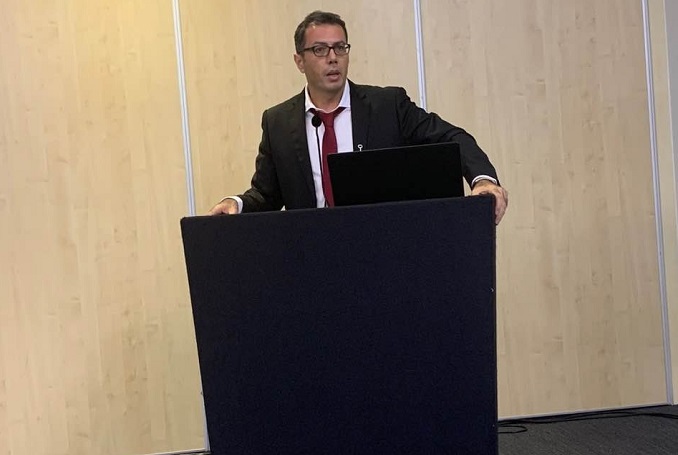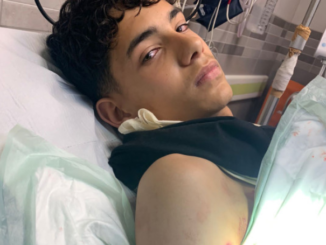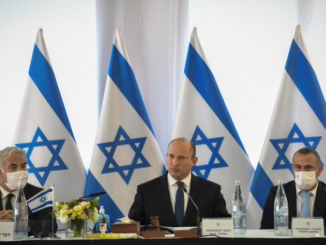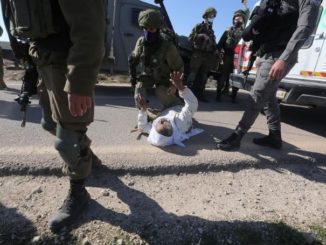
Organized by the British NGO Friends of Al-Aqsa (FOA), Palestine Expo has been dubbed the ‘biggest Palestine event in Europe‘, being held in the iconic Olympia Exhibition Centre in London.
The Palestine Chronicle chief editor, Dr. Ramzy Baroud, addressed the audiences in two panels on Saturday, dedicated to the problem of illegal Israeli Jewish settlements and the marginalization of Palestinian voices in mainstream media.
An Insightful weekend at the Palestine Expo. An inspirational speech from the grandson of Nelson Mandela, Zwelivelile Mandela, a weekend full of culture and heritage and a great ending, with having my book personally signed by Dr Ramzy Baroud! #PalestineExpo pic.twitter.com/tsE9F2kS20
— Sara Patel (@elle_est_Sara) July 7, 2019
“Israel, as a whole, is a settlement project”, Baroud said.
In fact, since the very beginning, Baroud said, Zionism ideologues saw their movement as a colonial one, as we can see in the words of the father of the Israeli right, Ze’ev Jabotinsky.
Baroud also stressed the need to consider the solidarity movement in its global dimension.
Friends and readers: I will be delivering two talks at the Palestine Expo in London. I look forward to meeting some of you there https://t.co/b6mO1KPW3q pic.twitter.com/qbSIT4nMMl
— Ramzy Baroud (@RamzyBaroud) July 5, 2019
“I have just returned from a speaking tour in Kenya. The fight is not only in Germany, in the UK, in France, and the US it is a global fight.”
Baroud highlighted the similarities between the Palestinian national liberation struggle and the African liberation struggles against British colonialism.
"Baroud is the first Palestinian writer to embark on such a tour of Kenya, and is impressed by the depth and quality of discussions that he is having with hundreds of Kenyans from all walks of life at diverse events across Nairobi" https://t.co/frtjCGW8BS #RamzyBaroudKenyaTour pic.twitter.com/muSemrky3H
— Ramzy Baroud (@RamzyBaroud) July 6, 2019
Palestinians have neglected the “global south” because of the Oslo peace process and a changing discourse that had convinced people that their destiny was connected to the West.
”But Israel has rediscovered the global south and they have penetrated Africa and South America and other places,” Baroud said. “We need to go back there and we need to resurrect their solidarity.”
Excited to be chairing two panels today at the @PalestineExpo
1. Settlements and House Demolitions with Issa Amro, Daphna Baram and Dr Ramzy Baroud.
2. Footsteps to Palestine with Justin Butcher and Benjamin Ladraa. pic.twitter.com/XEWV8vzaHU
— Faiz Ilyas (@faizilyas) July 6, 2019
“One thing about Africa that I noticed is that we don’t have to contend with the tiny little bits of the discourse – nobody accuses you of anti-Semitism, it is not even on the agenda of African audiences: what they talk about there is national liberation.”
In the second panel, dedicated to the marginalization of Palestinian voices, Baroud urged the audience to reverse the current communication paradigm, which is – even at a subconscious level – dominated by an agenda dictated by the Zionists.
Palestinian journalist and author Ramzy Baroud – who had just returned from a 10-day solidarity tour to Kenya – told the event in the UK capital that a new front in Palestinian activity should be aimed at the developing world https://t.co/xPbwB7b2J3 pic.twitter.com/cwjD7sSx2c
— Ramzy Baroud (@RamzyBaroud) July 7, 2019
“At the end of the day”, Baroud said, “Israel is still there because of the narrative that they were able to produce and to sell to so many nations, especially in the West.”
Baroud called for Palestinians to produce their own narrative. “The Zionists have been theorizing for 150 years. We did not counter this movement until a few decades ago”.
Baroud reminded how the language itself has been changed by Oslo and the so-called “peace process”, which has replaced the concept of national liberation.
“More important than owning media platforms,” he continued, “is owning the narrative of the Palestinian people”.
(Palestine Chronicle, Social Media)







